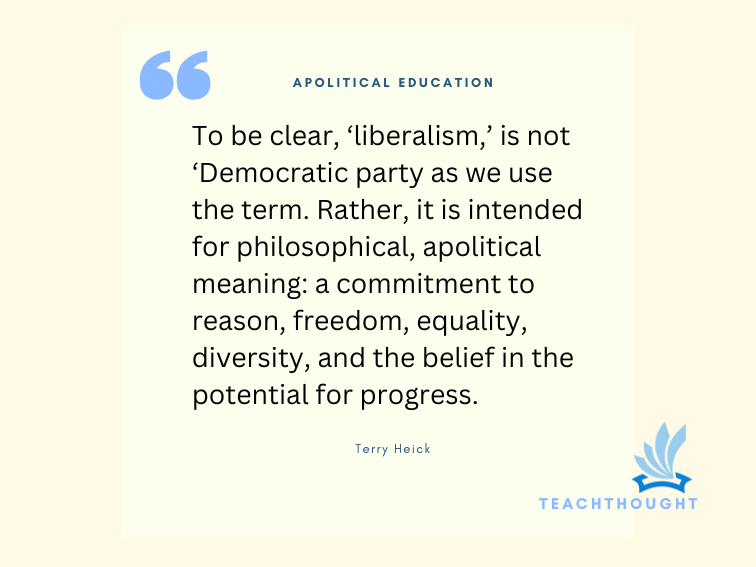

Standing for critical thinking and progress
by Terrell Heick
At Teachthought, we have always focused on promotion critical thinking Cross for use in “human” applications-namely, people (that is to say stakeholders in education) and places (that is to say communities).
Our mission was apolitical by conception – determined to improve thought, education and human potential without aligning yourself with political ideologies or factions.
However, recent events in the United States have made entirely apolitical luxury entirely apolitical that we can no longer afford.
The idea of liberalism in education
It brings us to the idea of liberalism.
Being clear, “liberalism” is not the “Democratic party as we use the term. It is rather intended for philosophical and apolitical meaning: a commitment to reason, freedom, equality, diversity and belief in the potential for progress.
Liberalism, in this sense, prioritizes the opening of openness and the values of dialogue, investigation and self -determination – all intrinsically at the heart of education itself.
Education seeks to empower individuals, allowing them to think critically, to embrace learning and to improve and their communities.
These are liberals ideal– Not in a partisan context but as fundamental intellectual principles to knowledge, democracy and justice.
Why adopt a “position”?
It is impossible to defend critical thinking while remaining silent on efforts aimed at suppressing individual thinking, reducing diversity, dismantling critical federal departments and resisting the progress that education aims to maintain.
Current circumstances require resistance to politicians who undermine civil freedoms, question inclusiveness and threaten the foundations of education itself.
A call to critical thinking
I serve / we oppose measures that restrict the survey, decrease diversity and compromise the integrity of education.
As an organization, we strive to promote and defend:
Critical thinking: The ability to question, analyze and synthesize knowledge in the face of increasing disinformation and partisanary.
Diversity (Cultural and intellectual): Recognition that inclusiveness enriches learning, creativity and understanding of the community.
The fact that these ideas are at all controversial could speak of the need for them to be recommended and supported.
In times increasingly technologically advanced and socially fractured, the role of critical thinking is – well, critical.
Questions such as the excessive use of social media, politicized partisanry and support for the decrease in public education require a response rooted in rationality, evidence and human values.
Our position
While we remain an organization focused on education, our commitment to critical thinking calls us to speak of the conditions that eroded confidence, inclusiveness and progress.
From the deliberate weakening of federal institutions to decisions which limit diversity and remove access to opportunities, we firmly oppose such measures.
The policies of the current administration in the United States represent a particularly urgent threat to these essential values, and personally, I am obliged to oppose it in the context of a wider advocacy for informed education and rational discourse.
Whatever the circumstance or the context, our objective will emphasize the power – and the necessity – of critical thinking to navigate the challenges of our time while maintaining respect for various voices, experiences and beliefs.
Terrell Heick
Director, Arrival
Founder and director of teaching



